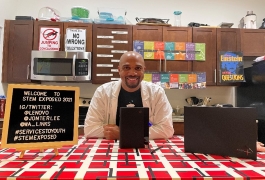How to Prepare for an Interview and Follow up Gracefully

Interviewing can be nerve-wracking and uncomfortable. Everything about you—your education, your personality, your skill set—is on the table. Whether your interview is face-to-face or virtual, what you do to prepare ahead of it and how you follow up can make a big difference in the outcome. Here’s what you need to know to be ready for your big day.
Practice, practice, practice
ACS Director-at-Large Marinda Li Wu recommends asking friends or family members to help you stage mock interviews. At the very least, she recommends practicing in front of a mirror to see how others see you. “To get the job, you’ve got to do a good interview,” she says.
Wu, an ACS career consultant who performs mock interviews and does career coaching, recommends getting used to looking your interviewer in the eyes when interviewing in the U.S. Eye contact is a sign of confidence and honesty. “Look your interviewer in the eye and smile” as part of making a good first impression, says Wu. If you aren’t comfortable with eye contact, you’ll need to practice.
Preparation for virtual interviews is equally important. “You want to be comfortable using technology,” says body language expert Blanca Cobb. “This means you need to play with it. Talk to a family member. Talk to a friend. Even set it up with your friend looking at you.”
Also keep in mind that in virtual interviews, both you and your background are on display.
Devote some time to staging an inviting background that doesn’t distract from the interview.
“It needs to be clean and tidy because that's making an impression of who you are as a person, whether you're organized or disorganized, whether clutter bothers you or not,” Cobb adds. “You want to make sure your lighting is right, so have somebody on that test Zoom call with you who can give you some feedback. Even how you're sitting in front of the camera is important.”
Prop up your laptop or computer monitor on a pile of books or a box to create the best view of yourself. “Ideally, it would be great to see your midsection and up, because then people can see your hands and your hand movements,” Cobb says. Even if you aren’t on camera, “you should smile, because believe it or not, it'll come through in your voice,” Wu says. “Smile and stand up or sit up straight. Somehow it comes through in the voice. If you speak in a monotone, no-energy tone, that’s not going to make the employer think you’re great. They want someone who is energetic.”
Cobb echoes the need to smile during face-to-face interviews to make a good impression. Smiling comes more naturally when you’re comfortable and relaxed, two big points Cobb stresses. “Work isn't only about work; it's about interactions and it's about people. It's about interactions with your boss, with your colleagues, with clients, with potential customers, with vendors, and the list goes on. So they're going to want to get a sense of how you are going to fit into that company culture.”
Do your research
Practicing for the interview is only half the battle. You also need to do your homework to learn about the company. Dawn Mason, a global external innovation manager at Eastman Chemical Co. in Raleigh, NC, and ACS Fellow, says that while her company was hiring candidates for internships, she and her team interviewed a student who particularly stood out because of how well he had prepared. “He knew our business,” she says. “He had prior project experience with an industrial partner, and he came with his portfolio showing all the work he had done,” says Mason.
Research the company well so you can show interviewers that you would be a good fit. “You need to understand the mission of the lab and tailor your message,” Mason says. “That means you’ve got to do some digging.”
Get the right materials together
Ahead of your interview, have some personal business cards made, advises ACS Career Consultant and Chair of the ACS Philadelphia Local Section Joseph Martino. Many companies offer inexpensive options that look fine. “And if you're a graduate student, some schools will print business cards for students to use,” Martino says.
Be sure to exchange cards with those you meet. “You're not only giving them contact information for yourself, you're also receiving from the individuals that are interviewing you their contact information so that you can follow up with them personally,” adds Martino.
When you receive a card, jot down a note or two about something you discussed with that person. If you can’t make notes right away, do so immediately after the interview. These notes will come in handy after the interview when you follow up with the people you meet.
The follow-up
Within 24 hours after the interview (sooner is always better), send an e-mail thanking your interviewers, recruiter, and hiring manager. “Be sure to thank them for the opportunity to interview, and indicate that you enjoyed meeting them and that you are still very interested in the job,” notes Martino. “And then after that, you want to personalize it.” One way to personalize your follow-up note is to bring up a topic you enjoyed discussing with them or an insight they shared that you found interesting, advises Martino. The point is to stand out from other candidates, he adds.
And remember to reach out to the hiring manager. “The quicker you get that thank-you to a hiring manager, it shows that you’re on the ball—you're responsive.”
If you don’t get the job this time around, you could be up for another one they are recruiting for.
When the job isn’t what you thought
Interviews are a two-way street: You are interviewing for a position but you are also interviewing employers to see if the company is a good fit for you, too. After an in interview, you should reflect on what you learned about the job, your potential colleagues, and your potential bosses. If something doesn’t feel right, you should let them know you are no longer interested in that opportunity.
Even if you don’t want to work there now or don’t even want that career anymore, you still want to leave a good impression with people who will be in your network and may help you make connections in the future.
The waiting game
Now, the waiting begins. Depending on the industry and size of the company, it can take between a few days to a few weeks for the interviewer to get back to you. Although waiting to hear back can be agonizing, be positive and patient. The good news is that if you are obsessing over hearing back, it means you really want the job. But you also have to be realistic. This means have a plan B and C if you don’t get the job.
Allow two weeks to pass, and if you haven’t heard back, Martino advises to “get on the phone and call the hiring manager and ask about the status of your candidacy.” Listen to their return protocol and if they don’t give you one, wait another two weeks and call again. Companies receive a lot of résumés, and it takes time to review them, interview candidates, do follow-up interviews, and return phone calls. So don’t count yourself out if you don’t hear back in a couple of weeks.
What not to do if you’re rejected
Mason says someone who had been rejected for a job called her to assure her they were the right person. “They weren’t really interested in the feedback I was willing to give. They just wanted to tell me they were the right person for the job, even though we told them that they weren’t.”
If you are rejected, it doesn’t necessarily mean you weren’t a good candidate. It just means someone was a better fit for the position—this time. Take time to reflect on how you prepared for your interview, how you presented yourself to the interviewers, and how much you knew about the company going into the interview. If you receive feedback from the hiring manager, study those notes. Sometimes interviews turn out to be practice runs for the next one, so don’t feel discouraged if you don’t get the job. Heed your notes, practice more, and be ready to conquer the next interview.




